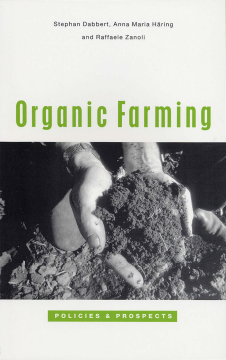
Additional Information
Book Details
Abstract
Consumers are more and more concerned with the health of the food they eat. While great public anxiety about genetically engineered foodstuffs and BSE in cattle has developed in Europe, on the positive side there has been a rapidly rising demand for organic produce. Food retailers, including supermarkets, have responded, and the organic sector has moved from a being marginal production fad to a serious subject of policy concern for politicians and public servants involved in European agricultural policy. In this book, three leading authorities on organic farming have for the first time produced a serious and scientific overview for the lay person of the state of organic farming and policy towards it in Europe.
Based on a review of a huge body of scientific research into all aspects of the sector, the authors provide in accessible terms a balanced, up-to-date and policy relevant overview of:
· The position of organic farming today - the size of the sector, its markets, where research is conducted, and current policies towards the sector.
· Assessment of its possible contributions to the environment, food quality, farmers' incomes, and rural development generally.
· Explanation of the key factors that will impinge on the organic farming sector in future and policy towards it as a result of the enlargement of the EU, ongoing negotiations at the World Trade Organisation, and Agenda 2000.
· Detailed recommendations for future organic farming policy.
Most people recognise that European agricultural policy has to change, involving further fundamental reform of the Common Agricultural Policy. This unique book will be of immense value to all those concerned with the issue, as well as of intense interest to those actually involved in the organic farming sector. Educationalists in agricultural universities and institutes will find the book a useful teaching tool.
Stephan Dabbert is Professor of Agricultural and Resource Economics and in October 2002 became Dean of the Faculty of Agriculture, at the University of Hohenheim in Stuttgart, Germany. He acts as an advisor to the EU Commission and the German Federal Government on organic farming policy issues, and has published widely in the area of organic farming, agri-environmental policy and water protection.
Anna Maria Haring is a researcher at the Interdisciplinary EU Project Organic Farming and the Common Agricultural Policy that is co-ordinated by the Institute of Farm Economics at the University of Hohenheim in Stuttgart, Germany.
Raffaele Zanoli is Associate Professor of Agro-Food Marketing at the Faculty of Agriculture, University of Ancona, Italy. He is a member of the European Association of Agricultural Economists and the European Society of Rural Sociology.
Table of Contents
| Section Title | Page | Action | Price |
|---|---|---|---|
| About the Authors | ii | ||
| Table of Contents | v | ||
| List of Boxes\r | vii | ||
| List of Tables | viii | ||
| List of Figures | viii | ||
| Glossary | x | ||
| Abbreviations | xiii | ||
| Acknowledgements | xv | ||
| Preface | xvi | ||
| C H A P T E R 1 Organic farming: grassroots movement or policy directive?\r | 1 | ||
| C H A P T E R 2 Organic farming in Europe at the dawn of the new millennium | 9 | ||
| Farms, land area and regional distribution | 9 | ||
| Institutions | 28 | ||
| Research and innovation | 30 | ||
| European policies for organic farming in the 1990s | 42 | ||
| Conclusions | 64 | ||
| Notes | 65 | ||
| C H A P T E R 3 Organic farming’s contribution topolicy objectives | 66 | ||
| Environmental performance | 66 | ||
| Food quality | 73 | ||
| Farm income | 76 | ||
| Rural development | 78 | ||
| Surplus reduction and government expenditure | 81 | ||
| Criticism of organic farming policy | 82 | ||
| Conclusions | 89 | ||
| C H A P T E R 4 A changing policy environment | 92 | ||
| Agenda 2000 | 93 | ||
| EU enlargement | 102 | ||
| WTO negotiations | 106 | ||
| Possible futures | 111 | ||
| C H A P T E R 5 Recommendations for future organic farming policy | 120 | ||
| An integrated approach | 120 | ||
| Status quo analysis | 122 | ||
| Objectives and strategic decisions | 124 | ||
| Instruments and addressees | 128 | ||
| Monitoring and control | 136 | ||
| Conclusions | 136 | ||
| References | 141 | ||
| Organisations with interest in organic farming\r | 149 | ||
| Index | 165 |
